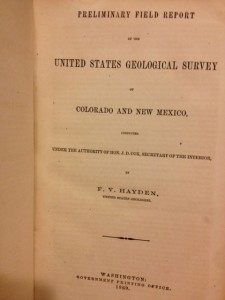In the summer of 1869, while John Wesley Powell was making his first journey down the Colorado River, Ferdinand V. Hayden, he of the famous Hayden surveys, was making a less notable journey down the eastern flank of the Rockies, from Colorado into New Mexico. Hayden’s primary purpose was geology, with an eye toward the region’s promise for mineral extraction. But he had with him the Rev. Cyrus Thomas, a botanist, whose task was, in part, to look at the region’s agricultural promise.
(I acquired a yellowed old copy this weekend of the survey party’s initial report to the Secretary of the Interior. You can read a slightly less yellowed copy here.)
The traditional narrative of the time, especially as told in Wallace Stegner’s Beyond the Hundredth Meridian: John Wesley Powell and the Second Opening of the West, has Powell as the lead character in trying to explain aridity to easterners headed west. But it’s clear from the initial observations of Hayden and his colleagues that Powell was not alone. Here’s Hayden at one point, describing western Nebraska:
These broad, level prairies are covered with a thick growth of short, nutritious grass, but the scarcity of water for the purpose of irrigation, and the almost entire absence of forest trees, must ever prevent settlements to any great extent. in the autumn nearly all the smaller streams dry up entirely.
And yet to the extent that flowing water was available to make up for the deficits of rainfall that eastern farmers counted on, Thomas sounded this strange (to our 21st-century ears) note of optimism about the necessity of irrigation:
This necessity is generally classed among the drawbacks to the agriculture of these territories, but there is some doubt as to the correctness of this conclusion, for, when we take into consideration the fact that where rain is depended upon there are frequently great losses incurred because of dry seasons, the question arises, “Is the loss by drought greater or less than the cost of irrigation?” The decision of this question must decide the point as to whether irrigation is really a drawback or not. That it is inconvenient and imposes a hardship upon the farmer of limited means, at the opening or settling of his farm, is true. But when his primary ditch is completed, if properly made, he may feel himself forever secure from loss through drought.
It hasn’t quite worked out that way.

